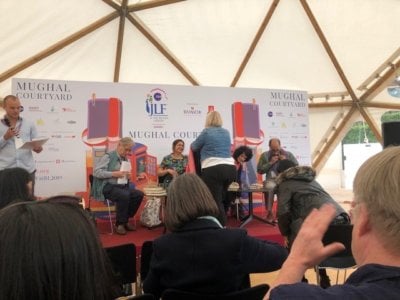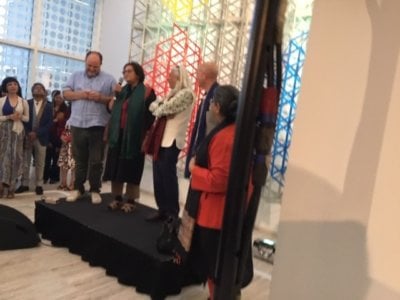Now that the Jaipur Literary Festival (JLF) in London is over, one needs a few days to reflect on what one learned from an intense weekend fizzing with ideas and discussions on a dizzying range of topics. ZEE JLF at the British Library in London has become a firm and welcomed fixture in the UK’s annual calendar. The literary festival, which originated in Jaipur a decade ago as a unique celebration of writing about South Asia, has extended its reach with international editions spread across destinations as diverse as Belfast, Houston, New York, Colorado, Toronto, and Adelaide. Lovers of words and literature are able to escape from the stresses of their daily lives to hear a host of famous authors talk about their books and exchange views on issues that matter to us all and analyze the significance and impact of historical events.
ZEE JLF is an exuberant celebration of literature, poetry, dance, the arts, and sport. I would add another word to define ZEE JLF in London this year – comforting. The reason for this is that today, when one is exposed to hate-filled messages in the media and in daily discourse, it was comforting to find that there are still people who believe in free expression, harmony, and pluralism. Even in the debates and discussions with speakers who fiercely held opposing views, the tone was civil and did not descend into vicious personal attacks as has become the norm in so many TV shows.
The sixth edition of ZEE JLF at the British Library commenced on Friday with the opening address titled “Imagining Our Worlds,” presented by Festival Co-directors Namita Gokhale and William Dalrymple, Festival Producer and Teamwork Arts Managing Director Sanjoy K Roy, British Library Chief Executive Roly Keating, and High Commissioner of India to the UK HE Ruchi Ghanshyam.
Gokhale said the Festival contributed to “something transformative,” which is happening in contemporary India where the country’s youth are inspired to listen to some of the finest minds of India – “It is the place where India thinks aloud,” she said. Dalrymple exclaimed what an extraordinary thing it was to watch the growth of this Festival, pointing out that it had received a footfall of over a million in its recent edition in Jaipur. Roy acknowledged the contribution of literature towards the creation of empathy and equity in the world, observing that literature rejoins the contemporary world of growing divisiveness. Keating, highly appreciative of the collaboration between the British Library and the Festival, said that “the fit could not be closer.” Ghanshyam expressed how events like these develop an understanding of place and people in the celebration of books and writers and “life itself.”

The Vanishing. Photo © Rita Payne
The keynote address, “Of Cities and Empire,” was by Tristram Hunt, Director of the V&A and former Labour MP, in which he discussed his book, “Ten Cities that Made an Empire.” Hunt addressed the change in the recent discourse on colonialism: “The danger now is that as we step into the language of lawsuits and official apologies, the space for detached historical judgement has narrowed. We need to stop approaching Empire in terms of good or bad and think intelligently and enquiringly about its paradoxes, as many of them are still with us.”
In the discussion that followed, author and historian Shrabani Basu discussed Hunt’s book along with Shashi Tharoor’s Glorious Empire. Regarding the recent movement in the decolonizing of museums, Hunt addressed the political violence of the past and the economic inequality of the present that surrounds the building of these collections. Tharoor suggested that it is concerning that so many historical items like these have been displayed in museums without the acknowledgement of the colonial context.
As usual, it was a challenge to decide which sessions to attend. The choice was extensive and difficult because often different sessions one wished to attend are on at the same time. The tendency is to gravitate towards sessions on themes in which one has a special interest. One stood out for me because it dealt with an issue which is vital for our survival – The Vanishing – in which conservationists, Prerna Bindra, Ruth Padel, and Raghu Chundawat, were in conversation with author and journalist, John Elliott. They spoke of the precarious balance between mankind and nature with forests shrinking as they are sold for development with a knock-on impact on wildlife. Around a century ago, it is estimated that there were 100,000 wild tigers, but by 2010, we had lost over 95% of the world’s wild tiger population mainly due to poaching and habitat loss. In the case of India, which is home to 60% of the world’s wild tigers, conservation efforts have yielded some success with the current number estimated to be around 2,200. However, one cannot afford to be complacent. It was disquieting to hear from Ruth Padel that when she raised her concerns about disappearing wildlife in India to a senior Indian politician, his cynical response was that wild animals do not have votes. She made the important point that the presence of wild tigers is a sign of a healthy forest. Without forests, which are the lungs of the world, the impact on the environment and humanity will be catastrophic.
We are already witnessing the devastating impact of damage to the environment caused by human activity. The speakers acknowledged that a key problem was to bring local communities on side whose livestock may have been killed by wild animals or who may have been attacked themselves. It was suggested that a solution might be to offer compensation to local people or enable them to benefit financially from tourism. The speakers also agreed that eco-tourism was the way forward and that it was possible to bring about rapid changes with the right policies.

Closing reception left to right – William Dalrymple, Namita Gokhale, Sanjoy Roy and Matt Reed, CEO, Aga Khan Foundation UK. Photo © Rita Payne
A demonstration of the diversity of topics covered was a session on “The Billionaires: Looking at the Indian Elite James Crabtree and Avi Singh” in conversation with Mukulika Banerjee. Crabtree, author of “The Billionaire Raj – A Journey Through India’s New Gilded Age,” spoke entertainingly about his close encounters with India’s super rich, such as the Ambanis and Vijay Mallya, while researching his book. His intention was to find out who they were, how they made their money, and what they thought of themselves. Crabtree says almost all of them felt mistreated by the media and its perceived failure to recognize the contributions they had made to India’s economic success. An increasing number of businessmen are now buying media houses to gain control of how they are perceived by the public.
On Saturday, audiences piled into sessions across the 3 sub-venues of the festival. In the session “The Gene Machine,” Nobel Laureate and President of the Royal Society Venki Ramakrishnan discussed his recent book with Roger Highfield of the Science Museum in London. Ramakrishnan observed that in order for science to flourish, it must allow and encourage freedom of thought and expression.
In “Masala Shakespeare,” Jonathan Gil Harris discussed his new book which celebrates a sub-genre of Hindi cinema popular in the late 1970s/80s: escapist crowd-pleasers called “masala films,” because they mixed tragedy with comedy, realism with over-the-top action, all punctuated with song and dance routines. The author draws a clear line from this timestamp back to Shakespeare, whose creative language was trans-cultural in much the same way as masala films.
The session “The Islamic Enlightenment: Faith and Reason” saw a discussion between Christopher de Bellaigue, an author and journalist who has worked extensively across the Muslim world, and Festival Co-director William Dalrymple, on the topic of tensions between faith and reason throughout the history of the Muslim world. De Bellaigue highlighted key historical social, political, and technological changes that took place throughout early modern history and the exchange that occurred between the Islamic world and the Western world.
In “The Begum,” panelists Deepa Agarwal, Namita Gokhale, Tahmina Aziz Ayub, and Muneeza Shamsie spoke with moderator Maha Khan Philips about Begum Ra’ana Liaqat Ali Khan, the pioneering First Lady of Pakistan in the mid-20th century – an activist, a feminist, a humanitarian, an academic, a diplomat, and philanthropist and mother. In a new book, Pakistani writer Tahmina Aziz Ayub and Indian writer Deepa Aggarwal came together in a cross-cultural. cross-border collaboration to tell the compelling story of this emblematic historical figure.
Other sessions on Saturday included: “Forgotten Masterpieces of Indian Art for East India Company” (Malini Roy, Yuthika Sharma, Katherine Butler Schofield, and Rosie Llewellyn-Jones in conversation with William Dalrymple); “Eve Was Shamed: How Justice Fails Women” (Helena Kennedy, Avi Singh, and Sunita Toor in conversation with Bee Rowlatt); “Tagore and the Bengal Renaissance” (Reba Som and Bashabi Fraser in conversation with Somnath Batabyal); “Words Are All We Have” (Anjali Joseph, Lijia Zhang, and Romesh Gunesekera in conversation with Catharine Morris); “#Tharoorisms” (Shashi Tharoor in conversation with Pragya Tiwari); “Mallika Victoria: Empress of India” (Miles Taylor and Shrabani Basu in conversation with Vayu Naidu); “Meetings with Remarkable Manuscripts” (Christopher de Hamel introduced by William Dalrymple); and “Amritsar and the Patient Assassin” (Anita Anand and Kim A. Wagner in conversation with Navtej Sarna).
Some claim that the prestigious event’s association with the ZEE media group lends credibility to a news channel accused of running polarizing reportage. There is, however, no denying that the Jaipur Literature Festival in India is a global literary phenomenon, having hosted more than 2,000 speakers and welcomed over a million book-lovers from across the globe over the past decade.
In London, ZEE JLF at the British Library brings the same universal, democratic, and inclusive core values of Jaipur’s annual literary carnival to the UK. It is an opportunity to hear top experts share their knowledge on subjects as diverse as threats to tigers and what makes India’s billionaires tick. One no longer needs to travel to Jaipur to be exposed to thought-provoking, challenging, and insightful debates and discussions. There is every chance that wherever you may be in the world, the renowned literary festival will come to a location near you.
WHAT TO TAKE AWAY FROM THIS ARTICLE:
- The sixth edition of ZEE JLF at the British Library commenced on Friday with the opening address titled “Imagining Our Worlds,” presented by Festival Co-directors Namita Gokhale and William Dalrymple, Festival Producer and Teamwork Arts Managing Director Sanjoy K Roy, British Library Chief Executive Roly Keating, and High Commissioner of India to the UK HE Ruchi Ghanshyam.
- Lovers of words and literature are able to escape from the stresses of their daily lives to hear a host of famous authors talk about their books and exchange views on issues that matter to us all and analyze the significance and impact of historical events.
- The reason for this is that today, when one is exposed to hate-filled messages in the media and in daily discourse, it was comforting to find that there are still people who believe in free expression, harmony, and pluralism.























